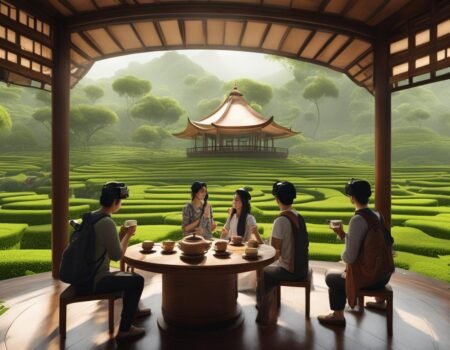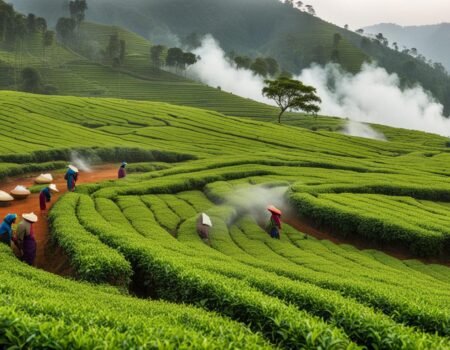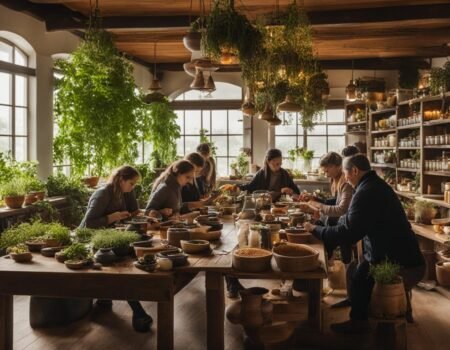
Celebrating Tea Festivals and Traditions in Major Producing Countries
Tea has a remarkable history and cultural significance that spans thousands of years. As we celebrate the world of tea festivals, let us take a journey through the major producing countries, where tea is not just a beverage but a symbol of tradition, community, and celebration.
Key Takeaways:
- Tea festivals in major producing countries showcase the cultural heritage and economic importance of tea.
- Events and exhibitions educate people about the sector’s contribution to livelihoods and sustainable development.
- Tea consumption has been steadily increasing globally, with Asia and Western countries embracing traditional tea celebrations.
- The cultural significance of tea is evident in various festivals and rituals around the world.
- Major producing countries like China, India, and Taiwan have their own unique tea traditions and festivals.
The Global Consumption of Tea
Tea is undeniably one of the most consumed beverages in the world, second only to water. Its popularity spans across continents, with cultural tea celebrations taking place worldwide. While countries like Turkey, Ireland, and the UK are known for their high tea consumption per capita, Asia, in particular, boasts a rich tradition of tea celebrations. These festivals offer unique experiences for tourists, allowing them to immerse themselves in the captivating world of tea.
Traditionally, tea celebrations in Asia are deeply rooted in cultural practices and customs. Countries such as China, Japan, Taiwan, and India have a long history of tea cultivation and consumption, making their tea festivals a must-visit for tea enthusiasts. These festivals showcase a wide range of activities and events, including tea tasting sessions, cultural performances, and traditional tea ceremonies.
“Tea is not just a beverage; it is a powerful symbol of cultural heritage and hospitality. The global consumption of tea is a testament to its enduring appeal and the universal joy it brings.”
Tea festival tourism experiences are a perfect way to explore the diverse flavors and traditions associated with tea in different parts of the world. Whether it’s experiencing the tranquility of a Chinese tea ceremony, savoring the vibrant matcha tea culture in Japan, or indulging in the unique bubble tea innovation in Taiwan, these festivals provide an immersive journey into the heart of tea culture.
| Country | Tea Festival | Activities and Events |
|---|---|---|
| China | The Qingming Festival | Tea ceremonies, tea art performances, tea tasting |
| Japan | The Uji Tea Festival | Traditional tea ceremonies, tea picking, cultural performances |
| Taiwan | The Taiwan International Tea Expo | Bubble tea workshops, tea competitions, tea-themed exhibitions |
| India | The Assam Tea Festival | Tea tasting, cultural performances, traditional tea ceremonies |
As tea continues to captivate our senses and bring people together, it’s worth celebrating the global consumption of this beloved beverage. With its cultural significance, rich history, and a plethora of tea festivals and activities, tea truly knows no boundaries.
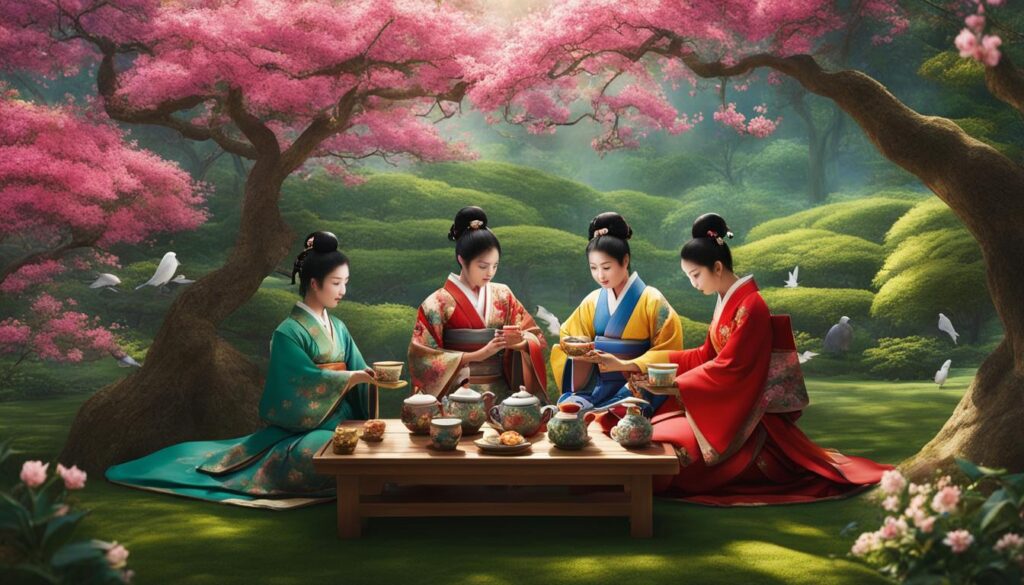
The Cultural Significance of Tea
Tea is not just a beverage; it holds great cultural significance in many countries around the world. From historical tea festivals in major countries to tea traditions passed down through generations, tea plays a vital role in traditional festivals and holidays.
In England, the Wassailing tradition involves drinking spiced black tea called wassail as part of a singing and visiting ritual. This centuries-old tradition is believed to bring good luck and ensure a fruitful harvest. Similarly, in Russia, flaming tea is consumed during the Hanukkah festival of lights, symbolizing warmth and illumination during the winter season.
The Chinese tea ceremony, known as Gongfu tea, is a revered ritual that promotes mindfulness and peace. It involves carefully brewing and serving tea using special tea sets and utensils. The ceremony emphasizes the importance of being present in the moment and appreciating the beauty and aroma of the tea.
Traditional tea parties are a cherished part of the holiday season in the UK. During Christmas, friends and family gather to enjoy a delightful spread of tea, accompanied by an array of snacks and desserts. These festive tea parties create a warm and cozy atmosphere, filled with laughter and joy.
“Tea is not just a beverage; it holds great cultural significance in many countries around the world.”
These cultural traditions and rituals showcase the deep connection between tea and cultural celebrations. They bring people together, foster a sense of community, and create lasting memories. Whether it’s a traditional tea ceremony, a festive tea party, or a unique tea ritual, tea remains an integral part of cultural heritage and identity.
| Country | Tea Tradition | Significance |
|---|---|---|
| England | Wassailing | Celebrates harvest and brings good luck |
| Russia | Flaming Tea | Symbolizes warmth and illumination during Hanukkah |
| China | Chinese Tea Ceremony | Promotes mindfulness and peace |
| United Kingdom | Traditional Tea Parties | Brings friends and family together during the holiday season |
Traditional Tea Rituals and Traditions
Tea is not just a beverage; it is a symbol of tradition, culture, and hospitality in many countries. From the serene tea ceremonies in China and Japan to the vibrant bubble tea culture in Taiwan, each nation has its own unique tea traditions and rituals that have been passed down through generations.
In China, the art of tea ceremony is deeply rooted in mindfulness and tranquility. These highly structured ceremonies focus on intentional movements, precise measurements, and the serving of tea with grace and elegance. It is a meditative experience that allows participants to find inner peace and connect with the present moment.
In Japan, the tea ceremony, known as “Chanoyu,” is closely associated with Zen Buddhism. It is a ritualized practice that emphasizes self-discipline, respect, and harmony. The ceremony involves the preparation and serving of matcha, a powdered green tea, in a traditional tea room. Participants engage in quiet contemplation and savor the moment as they enjoy the rich flavors and aromas of the tea.
Taiwan, renowned for its bubble tea, also embraces traditional tea rituals. Influenced by Chinese and Japanese traditions, Taiwan has developed its own unique tea culture. The island is known for its high-quality teas, such as oolong and black teas, which are brewed with precision and enjoyed for their complex flavors. Alongside these traditional brewing methods, Taiwan has also popularized the innovative and refreshing bubble tea, a modern twist on tea with added tapioca pearls or jelly.
“Tea is not just a beverage; it is a symbol of tradition, culture, and hospitality in many countries.”
The Russian tea tradition and Indian hospitality
In Russia, tea holds a special place in traditional gatherings and hospitality. The iconic samovar, a large metal container used to boil water, is synonymous with Russian tea culture. The host brews a strong tea concentrate called “zavarka” in the samovar and dilutes it with hot water, creating a communal pot of tea that is shared among family and friends. Tea is served with an assortment of sweets, pastries, and preserves, creating a warm and inviting atmosphere.
In India, tea is an integral part of the country’s identity, and its hospitality customs are legendary. Masala chai, a spiced tea made with milk and a blend of aromatic spices, is a popular beverage enjoyed throughout the day. Indian households often invite guests for a cup of tea, showcasing their warm and welcoming nature. During festivals and special occasions, elaborate tea parties are organized, where tea is served alongside an array of snacks and desserts.
| Country | Tea Tradition |
|---|---|
| China | Highly structured tea ceremonies focused on mindfulness and grace. |
| Japan | Zen-inspired tea ceremonies emphasizing self-discipline and harmony. |
| Taiwan | Traditional tea brewing methods and the innovative bubble tea trend. |
| Russia | Samovar brewing and communal sharing of tea. |
| India | Warm hospitality with masala chai and festive tea parties. |
These traditional tea rituals and traditions highlight the cultural diversity and richness of tea appreciation around the world. Whether it is the serenity of a tea ceremony or the warmth of hospitality, tea brings people together, creating moments of connection and celebration.
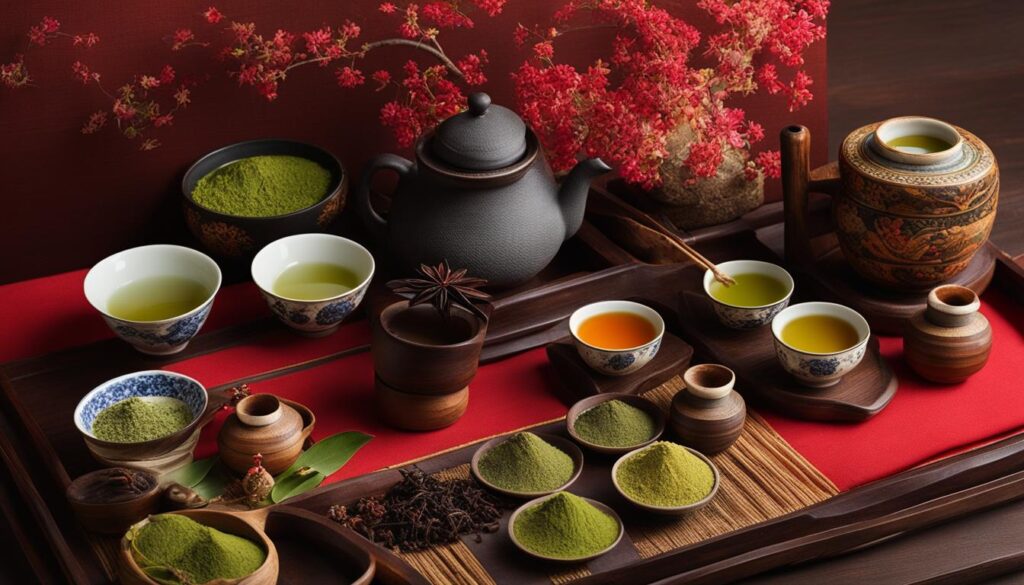
Tea Traditions in Major Producing Countries
Tea traditions and festivals in major producing countries, particularly in Asia, are deeply rooted in rich cultural customs and practices. These events offer a captivating experience for tea enthusiasts and tourists alike, showcasing the diversity and beauty of tea cultures around the world.
One of the most renowned tea traditions is China’s centuries-old tea ceremony. This ritualistic practice emphasizes mindfulness and harmony, with every step carefully executed to create a serene and meditative atmosphere. From the careful selection of tea leaves to the precise pouring and serving techniques, the Chinese tea ceremony is a true reflection of the country’s deep appreciation for tea and its cultural significance.
In India, tea is not just a beverage but a symbol of hospitality. The Indian tea traditions are characterized by the popular masala chai, a spiced tea blend that combines aromatic spices such as cardamom, ginger, and cinnamon. Tea gatherings during festivals and social gatherings are a common practice, bringing people together to share stories, laughter, and a warm cup of tea.
Japan, famous for its tea culture, offers a unique and refined tea experience through its tea ceremonies. These ceremonies, often conducted in traditional tea houses, follow a strict set of rituals and etiquette. Matcha, a powdered green tea, is commonly used, and each movement, from the preparation to the presentation of the tea, is performed with grace and precision.
The Beauty of Tea Festivals
Tea festivals in these major producing countries provide a vibrant and immersive experience, allowing visitors to delve into the world of tea through various activities and events. From tea tastings to cultural performances, these festivals celebrate the art of tea-making and offer a deeper understanding of the tea culture.
For example, the Lu-Yu Tea Culture Festival in China is a grand celebration of tea that features exhibitions, tea competitions, and cultural performances. Visitors can explore different types of tea, witness tea ceremonies, and learn about the history and traditions of Chinese tea.
In India, the Assam Tea Festival showcases the state’s rich tea heritage. The festival includes tea tasting sessions, cultural performances, and a chance to interact with tea experts and small tea growers. It provides a unique opportunity to witness the entire tea-making process, from plucking the leaves to the final product.
“Tea is not just a drink; it is a way of life. Each sip encapsulates centuries of tradition and cultural heritage.”
The Fascinating World of Tea
Tea traditions in major producing countries offer a glimpse into the captivating world of tea, where each sip tells a story. These traditions not only serve as a reminder of the cultural significance of tea but also invite us to embrace the beauty of connection, mindfulness, and shared experiences that tea brings.
Whether it’s the serene elegance of a Chinese tea ceremony, the warmth and hospitality of Indian tea gatherings, or the refined rituals of a Japanese tea ceremony, tea traditions around the world unite us in a celebration of heritage and a reverence for nature’s gift. Let’s raise our cups and explore the fascinating world of tea traditions together!
Conclusion
As we conclude this journey through the world of tea festivals and traditions, we can’t help but marvel at the richness and diversity of tea culture globally. From the spiritual tea ceremonies of China to the warm hospitality of India’s masala chai, tea holds a special place in the hearts and traditions of people around the world.
Celebrating tea festivals is not just about sipping a cup of tea; it’s a way to honor the cultural heritage and economic significance of this beloved beverage. These festivals provide a platform to showcase the artistry and craftsmanship that goes into tea production and processing, while also supporting the livelihoods of millions of people.
By embracing and celebrating tea culture on a global scale, we can foster a deeper understanding and appreciation for the role that tea plays in our lives. Let us raise our cups and toast to the beauty of tea festivals, the richness of tea traditions, and the joy of coming together to celebrate this timeless drink.
FAQ
What is the significance of International Tea Day?
International Tea Day is celebrated to recognize the cultural heritage and economic importance of tea. It is an opportunity to educate people about the tea sector and its contribution to livelihoods and sustainable development.
How does tea production and processing support economies?
Tea production and processing play a vital role in reducing poverty and supporting economies. The tea sector is a source of income for over 13 million people worldwide and supports economic growth in tea-producing regions.
What are some of the challenges faced by the tea sector?
The tea sector faces challenges such as climate change and the need to support smallholder tea producers. Climate change affects tea cultivation, and supporting smallholder producers is crucial for ensuring the sustainability of the sector.
Which countries consume the most tea?
Turkey, Ireland, and the UK rank high in tea consumption per capita. However, countries in Asia also have rich tea cultures and traditions, with China, Japan, Taiwan, and India being notable tea-loving nations.
How does tea play a role in cultural celebrations?
Tea holds great cultural significance in many countries and plays a significant role in traditional festivals and holidays. It is consumed and celebrated in various ways, such as through traditional tea ceremonies and special tea-related rituals.
What are some unique tea rituals and traditions in different countries?
China has highly structured tea ceremonies focusing on peace and intentional movements. Japan emphasizes self-discipline and zen-like practices in its tea ceremonies. Taiwan combines Chinese and Japanese traditions and is known for its bubble tea innovation. Russia uses samovars to serve large amounts of tea and has tea as an essential part of hospitality. India is famous for masala chai and its tea-related hospitality customs.
What can I expect at tea festivals and celebrations in major producing countries?
Tea festivals and celebrations in major producing countries offer unique experiences such as tea tasting, cultural performances, traditional tea ceremonies, and opportunities to learn about the tea sector. These events showcase the rich cultural heritage and economic importance of tea.
How can celebrating tea culture globally contribute to sustainable development?
By celebrating tea culture globally, we can appreciate the diverse ways in which tea brings people together, nourishes the body and soul, and contributes to sustainable development. It highlights the economic importance of the tea sector and its role in supporting livelihoods.



